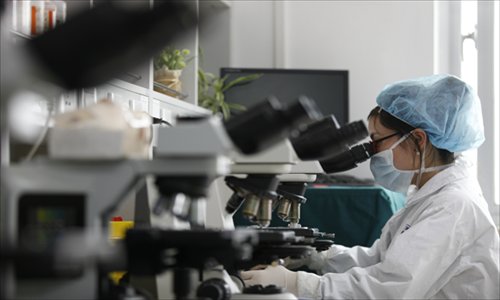

A sperm bank doctor analyses a sample in the Renji Hospital laboratory. Photo: Cai Xianmin/GT
For many young men in Shanghai it sounds an ideal way of making money while enjoying themselves. The Shanghai Municipality Human Sperm Bank pays up to 5,000 yuan ($821) to donors and hundreds of hopefuls arrive at the bank every week.
They head to the northern branch of Renji Hospital on Lingshan Road where, on the third floor, they will find the reception desk and entrance decorated with cartoons of cheerful sperm.
But it's far from cartoon fun in reality. Li Zheng is the director of the Shanghai Municipality Human Sperm Bank and he said the bank had two big problems. "The quality of the sperm offered is not good and there are not enough suitable donors."
Of the thousands of volunteers the bank sees every year, only 15 percent qualify as donors and 10 percent of these men will drop out after being accepted.
Ten years after it was established there are only around 5,000 sperm donations being stored at Renji at present although several thousand women have been impregnated. It's even more problematic in other parts of China where sperm banks only hold a tenth of this number of donations.
In 1988, China's first sperm bank was founded in Hunan province. In 2003, the then Ministry of Health of China formally approved that the Shanghai sperm bank be established in Renji Hospital. Of the 17 sperm banks in China the Shanghai bank is one of the most successful, handling the most cases and having the best record for research.
Donors wanted
Liu Yong is the senior technical officer with the sperm bank and told the Global Times that the bank tried to attract donors by sending out brochures to universities and posting information on social media websites. "Although donating sperm is an altruistic thing, under the Ministry of Health regulations we are not allowed to advertise."
Liu said college students had more free time and more flexible schedules than most people so it was more likely they would be able to be valid donors. But the bank's promotional attempts often met with obstacles and opposition which he blamed on traditional Chinese conservatism.
Chen Kai, a senior college student told the Global Times, he had seen the recruitment posters in the university as well on Renren (the most popular Chinese college student social networking website) several times. He once called the bank out of curiosity but when the complex donation procedure was explained he hung up from shyness.
"We get dozens of calls every day," said Du Hongwei, one of the bank's doctors. Up to 80 men come to the bank daily during the week and on Saturdays and Sundays about 360 turn up. According to the China Population Association more than 40 million people had fertility problems in 2012.
Du said the first stage for a volunteer was an interview with a doctor who would ask basic personal questions and then the man would fill in the application form. Among the usual questions about age and education (donors have to have graduated from secondary school at the least), applicants have to describe their character and their hobbies and pastimes, whether they like music, art, sports or literature. "It's important to know about the donors."
Next the applicants undergo a physical examination which includes blood pressure readings and an eye test but focuses on their reproductive health.
After this is completed the men are given a small jar and go to a private room to produce their semen which is then sent to the laboratory immediately where it is analysed for volume, density, motility and vitality.
Hu Hongliang is the sperm bank's laboratory director and explained that while a normal concentration of a sample can be 15 million sperm per milliliter the bank sets a minimum level of 60 million sperm per milliliter.
"The concentration varies greatly. Some donors can have 200 million sperm per milliliter while other applicants suffer from very low levels or infertility." Hu said sometimes a man came to the sperm bank intending to donate but discovered he might actually need to use the bank himself in the future.
This lab examination removes more than 60 percent of the applicants. The remaining volunteers then undergo a blood test which checks especially for hepatitis B and HIV. More than 10 percent find themselves excluded when hepatitis B is detected. The semen samples are tested further for diseases and a second blood test is run to eliminate hepatitis C and sexually transmitted diseases.
Copyright ©1999-2018
Chinanews.com. All rights reserved.
Reproduction in whole or in part without permission is prohibited.